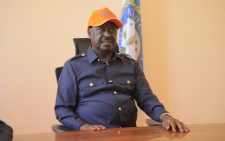Sh2.5b Worldcoin deposits withdrawn through M-Pesa

At least Sh2.5 billion was injected into the economy and withdrawn through M-Pesa by Kenyans who had their eyes scanned by the crypto-currency project firm, Worldcoin.
It emerged during a parliamentary committee hearing that by the time the government suspended the company’s activities, neither the National Treasury nor security agencies had flagged the transactions as suspicious.
Central Bank of Kenya Governor Kamau Thugge, who also appeared before an adhoc committee investigating the activities of the American firm submitted that CBK did not take part in licensing or clearing the proprietors of Worldcoin.
Njoroge also disclosed that the CBK had no knowledge of Worldcoin’s activities in the country. He said CBK did not flag the Sh2.5 billion because M-Pesa handles large volumes of cash daily.
Control cryptocurrencies
“M-Pesa does transactions totalling hundreds of billions in a day and, therefore, it would take time to identify all the transactions and the source,” he told the committee chaired by Narok West MP Gabriel Tongoyo.
He said what needs to be done to control cryptocurrencies is to regulate the sector.
When they appeared before the committee last week, the National Computer Cybercrime Coordination Committee (NC4) told the MPs that by the time of the suspension, at least 350, 000 had already registered with Worldcoin by having their irises scanned.
“The registration was done in exchange for the digital ID also called World ID and free cryptocurrency as part of plans “to create a new identity and financial network,” NC4 director David Njoga.
When he appeared before the committee on Monday, Director of Criminal Investigations (DCI) Mohammed Amin revealed that each of the 350,000 Kenyans was paid in cryptocurrency, translating to about Sh7,000. Although the committee’s session with the DCI was held in camera, it’s Vice Chair, Maara MP Kareke Mbiuki, revealed that Amin had confirmed to the committee that the payment was in cryptocurrency which was then converted to hard cash through MPesa withdrawals.
“The DCI told this committee that those who registered with Worldcoin had confirmed being paid in cryptocurrency,” said Mbiuki.
Medical assistance
Following the revelations by the DCI, the committee said they would summon Safaricom which runs the Mpesa platform to explain why they could not flag off the transaction.
And in a fresh turn of events, three youths who had their irises scanned said they received Sh2,000 each as opposed to the Sh7,000 promised by Wolrdcoin.
The three, Bruce Bogita, Marabe Mogusi and Bernard Ochieng also claimed that they have since developed eye problems.
The witnesses told the committee that after undergoing the scan, they started experiencing eye problems and had to seek medical assistance.
“After the scan, my eyes started becoming watery. I have been on prescribed glasses ever since that time. I don’t know if it is a coincidence or it is the world coin scan,” Ochieng told the committee.
Last week, Kisumu East MP Shakir Shabir claimed that a section of individuals who had their irises scanned were experiencing health issues, a claim the Ministry of Health officials did not dispute.
He caused laughter when he said that the scan on the eyeballs was meant to ascertain that the user being registered was indeed a human being. “We were told that the import of the scanning was to establish whether the iris belonged to a human or vice versa,” he explained.
They went on to narrate how they were promised Sh7,000 only to get Sh2,000 with a promise that they would get the balance at a later date.
“They came to school and registered us. They used Iris scan to verify that you are a human being. Upon verifying that you are a human being, they would give you 25 World coins which is currently equivalent to $70. They promised Sh7,000 but I got only Sh2,000 on my M-Pesa,” Ochieng recounted.
The witnesses told the committee that there was no written consent between Worldcoin and those who had their eyeballs scanned and private data collected.
The student also submitted that some of those who signed up for Worldcoin are undergoing a lot of social stigma, especially from peers who did not get scanned.












